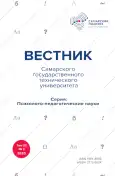Использование новогодней тематики для формирования лингвокультурной компетенции у студентов, изучающих РКИ: практический аспект
- Авторы: Горлова Е.А.1, Полухина М.О.1
-
Учреждения:
- Самарский государственный технический университет
- Выпуск: Том 22, № 2 (2025)
- Страницы: 73-88
- Раздел: Теория и методология образования
- URL: https://bakhtiniada.ru/1991-8569/article/view/310341
- DOI: https://doi.org/10.17673/vsgtu-pps.2025.2.5
- ID: 310341
Цитировать
Полный текст
Аннотация
Формирование лингвокультурной компетенции у студентов, изучающих русский язык как иностранный (РКИ), является одной из ключевых задач современного образования. Это способствует не только освоению языковых норм, но и пониманию культурных контекстов, что повышает эффективность обучения. В статье рассматривается использование новогодней тематики как средства интеграции языковых и культурных компонентов в процесс обучения. Цель исследования – разработка и апробация методики формирования лингвокультурной компетенции через создание материалов, отражающих русские новогодние традиции. Методология включает создание аутентичного видеоконтента с использованием платформы InVideo AI и разработку комплекса упражнений для развития навыков аудирования, говорения и письма. Результаты показали, что новогодняя тематика эффективно способствует формированию лингвокультурной компетенции студентов, помогая развивать ключевые языковые навыки и улучшая усвоение культурных особенностей. Предложенная методика демонстрирует системный подход к преподаванию РКИ и имеет практическую ценность для образовательных учреждений, а также найдет применение при самостоятельном изучении языка. Использование новогодней тематики оказалось эффективным инструментом интеграции языковых и культурных компонентов, что способствует более глубокому пониманию как языка, так и культуры. Таким образом, исследование не только обогащает существующие методические подходы, но и предлагает новые практические решения для формирования лингвокультурной компетенции студентов, что является актуальной задачей в преподавании иностранных языков.
Полный текст
Открыть статью на сайте журналаОб авторах
Екатерина Александровна Горлова
Самарский государственный технический университет
Автор, ответственный за переписку.
Email: eagorlova13@rambler.ru
кандидат педагогических наук, доцент кафедры «Педагогика, межкультурная коммуникация и русский как иностранный»
Россия, ул. Молодогвардейская, 244, Самара, 443100Марина Олеговна Полухина
Самарский государственный технический университет
Email: marinailyukhina@gmail.com
кандидат педагогических наук, доцент кафедры «Педагогика, межкультурная коммуникация и русский как иностранный»
Россия, ул. Молодогвардейская, 244, Самара, 443100Список литературы
- Бутыльская Л.В. Социокультурные аспекты изучения русской новогодней открытки // Гуманитарный вектор. Серия: Филология, культурология, искусствоведение. – 2013. – № 1. – С. 34–42.
- Орехова И.А., Труханова Д.С. Методические принципы организации занятий по РКИ с целью продвижения русского языка // Россия в мире: проблемы и перспективы развития международного сотрудничества в гуманитарной и социальной сфере: Материалы VIII Международной научно-практической конференции. Москва – Пенза, 2020. – С. 107–118.
- Милосердова Е.М., Самородова Т.В. «Русский клуб» как метод лингвокультурной адаптации иностранных студентов в условиях языковой среды // Вестник ТГУ. – 2021. – № 192. – С. 50–58.
- Егоркина Ю.Э. Формирование социокультурной компетенции иностранных учащихся на занятиях по РКИ. – Минск, 2011. – 44 с.
- Крылова Н.В. Формирование лингвокультурной компетенции у студентов, обучающихся русскому языку как иностранному, с использованием тематических текстов // Вестник Московского университета. Серия 19: Теория и практика преподавания иностранных языков. – 2017. – № 3. – С. 85–95.
- Трушкова Е.А. Формирование лингвокультурной компетенции у студентов РКИ через изучение русских новогодних традиций // Russian Language and Culture. – 2020. – № 8. – С. 67–79.
- Яковлева И.И. Методика формирования лингвокультурной компетенции студентов РКИ с использованием традиционных праздников // Научные исследования в образовании. – 2018. – Т. 6. – № 2. – С. 45–53.
- Пяо Лисян. Формирование коммуникативно-поведенческих параметров лингвосоциокультурной компетенции: автореф. дис. … канд. пед. наук [Электронный ресурс]. – URL: https://www.dissercat.com/content/formirovanie-kommunikativno-povedencheskikh-parametrov-lingvosotsiokulturnoi-kompetentsii (дата обращения: 27.12.2024).
- Дьякова Т.С. Роль культурного контекста в обучении русскому языку как иностранному: исследование и практика // Русский язык за рубежом. – 2019. – № 2. – С. 34–42.
- Костина Е.А. Использование аутентичных материалов для развития лингвокультурной компетенции у студентов РКИ // Современные технологии в образовании. – 2020. – Т. 13. – № 4. – С. 25–30.
- Виноградова С.В. Реализация лингвокультуроведческого аспекта обучения русскому языку как инструмент социальной адаптации // Современные тенденции в преподавании и изучении русского языка как иностранного: Материалы международной научно-практической конференции. – М., 2022. – С. 62–65.
- Виноградова С.В. Использование некоторых форм внеаудиторной работы с иностранными студентами при обучении РКИ // Воспитательный процесс в медицинском вузе: теория и практика: Сборник научных трудов по материалам Всероссийской научно-практической конференции с международным участием. – Иваново, 2022. – С. 28–30.
- Агафонова Л.Н. Применение культурных элементов в преподавании РКИ: новогодняя тематика как инструмент мотивации // Педагогика и психология. – 2021. – Т. 24. – № 1. – С. 112–120.
- Жданова Ю.В. Работа с кинотекстом на занятиях РКИ в японской аудитории (из опыта работы в японо-российском обществе дружбы Ничирокёкай) // Русский язык и литература в пространстве мировой культуры. – 2015. – № 6. – С. 101–113.
- Черкес Т.В., Флянтикова Е.В. Роль социокультурного компонента при формировании грамматической компетенции в РКИ: методы и приемы организации занятия // Theoretical & Applied Science. – 2018. – № 2. – С. 99–110.
- Балыхина Т.М., Нетёсина М.С., Хилькевич С.В. Грамматический тренажер как средство формирования лингвокультурной компетенции. – М., 2017. – С. 65–75.
- Byram M. Teaching and Assessing Intercultural Communicative Competence. Multilingual Matters. 2020. Р. 200.
- Kramsch C. The Multilingual Subject. Oxford: Oxford University Press, 2009. Р. 231.
- Бурмистрова Т.А. Идиоматический потенциал лексем город и деревня в содержании обучения РКИ // Довузовский этап обучения в России и мире: язык и культура. – 2021. – № 5. – С. 134–144.
- Айджанович Н., Гинич Е. Лингвокультурологический аспект в учебнике «Ни пуха ни пера!» // XV Конгресс МАПРЯЛ: Избранные доклады / Отв. ред. М.С. Шишков. – СПб.: МАПРЯЛ, 2024. – С. 405–411 [Электронный ресурс – URL: http://elibrary.udsu.ru/xmlui/bitstream/handle/123456789/22670/397лб_16.10.2024_Интернет.pdf?sequence=1 (дата обращения: 28.12.2024).
- InVideo AI [Электронный ресурс]. – URL: https://invideo.io/ru/sozdayte/ai-video-generator/ (дата обращения: 28.12.2024).
- Соловова Е.Н. Методика обучения иностранным языкам: продвинутый курс. – М.: Просвещение, 2008. – С. 92–109.
- Поползухина Е.П. Лингводидактический потенциал загадок в обучении русскому языку как иностранному // Научные исследования в области образования. – 2018. – № 2. – С. 112–118.
- Лингвострановедческий словарь «Россия» [Электронный ресурс]. – URL: https://ls.pushkininstitute.ru/storage/et/novgod_et_1/ (дата обращения: 27.12.2024).
- Лабунец Н.В., Эртнер Е.Н. Национально-гастрономические ценности в межкультурной коммуникации: лингвострановедческий подход // XVII Виноградовские чтения: Сборник научных трудов Международной научно-практической конференции. Екатеринбург, 2021. – С. 292–296.
- Персиянова С.Г., Ростова Е.Г. Формирование профессиональной (лингвокультурной) компетенции итальянских студентов-культурологов // Современные проблемы науки и образования. – 2019. – № 1. – С. 45–56.










